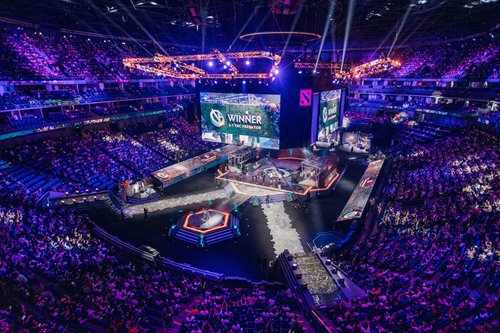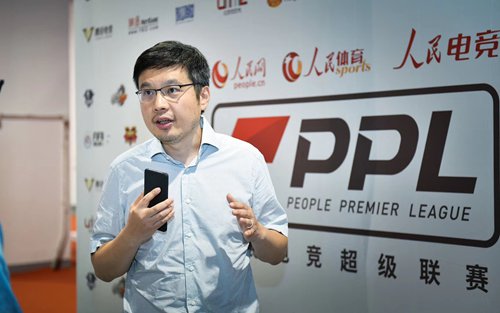HOME >> ARTS
Esports’ long, hard road toward recognition and legitimacy in China
By Tao Mingyang Source:Global Times Published: 2019/8/26 18:48:40

The International 2019 Dota 2 tournament at the Mercedes-Benz Arena in Shanghai on August 20 Photo: Courtesy of Perfect World

Li Xiaodong Photo: Courtesy of People's Esports
With teams splitting up $34 million in prize money, the largest prize pool ever for an esports competition, the annual international tournament for Dota 2 came to a close at the Mercedes-Benz Arena in Shanghai on Sunday.
Hosted by US video game developer, publisher and digital distribution company Valve Cooperation, The International is one of the biggest esports tournaments in the world. Dota fans and video games lovers from all around the globe tuned in to root for their favorite teams.
Among these teams, Chinese esports teams and players have contributed much to promoting the industry in China, helping remove the stigma around video games and pushing esports into the mainstream of Chinese culture.
Esports craze
At the final of Ti8 (The International 2018) in Vancouver, Canada, on August 26, 2018, Valve announced that the Ti9 would be held in Shanghai.
For Ti9, four Chinese teams - Vici Gaming, PSG.LGD, Keen Gaming and Royal Never Give Up - and 14 other esports teams from around the world competed for the championship and the roughly $16 million that would go to the No.1 team.
After four fierce battles with Team Liquid, OG from Europe won the championship to bring home the symbol of the winner - the Aegis of Champions. PSG.LGD from China came in at third place.
On China's Twitter like social media platform Sina Weibo, Ti9 topics were trending. The tournament is a big deal in China as Chinese teams have previously won three championships and five second places.
This is the first time that The International has been held in Asia, meaning Chinese Dota fans this year did not have to worry about time zone differences if they wanted to tune in to watch a match.
Tickets to the actual matches were also a major topic of discussion and contention in China.
According to entertainment ticketing platform Damai, 26,804 full-pass tickets to all the matches sold out in just 53 seconds of going on sale.
However, many netizens complained on Sina Weibo that they didn't get a chance to purchase a ticket before the servers crashed.
Many netizens suspected that these tickets were picked up by scalpers because Dota began selling them prior to the original scheduled release date.
Some netizens said the resale price for a front row ticket reached as high as 12,000 yuan ($1,691), which reflects the high popularity of the game in China.
From villain to hero
Video games and esports haven't always been as accepted as they are today in China.
For instance, in 2000 an article was published in Chinese newspaper the Guangming Daily titled Video Games: "Digital Heroin" Targeting Children. The article was an undercover investigation into internet cafes and portrayed video games as "devils" and "monsters."
"I remembered when I was about 8 years old, many reports about video games were negative," said Li Changxiao, a 25-year-old video game lover.
"Internet cafes were seen as the equivalent to a night club full of bad guys… I never imagined at the time that video games and esports could become as popular as they are now in China."
Several wins in the past few years have helped raise the profile of esports considerably.
In 2018, a Chinese esports team won two gold medals and one silver medal at the Jakarta Palembang 2018 Asian Games; Chinese esports team IG defeated all international opponents at the 2018 League of Legends World Championship; in the Overwatch World Cup 2018, Chinese team managed to win second place.
These wins have helped inject confidence into the industry and give professional players in China an air of legitimacy.
"The fact that such a high-level esports match can be held in Shanghai shows the maturity of the environment, market and industry chain of China's esports," Xiao Hong, CEO of Valve's cooperative partner in China Perfect World, told the Global Times.
"We are very confident that we will hold more international esports matches in the future and build China into the largest and best esports market."
'Right on track'
Li Xiaodong, director of the operation center for the State-run People's Esports, has gone to great lengths to promote China's esports industry, such as establishing the People Premier League and organizing esports matches.
"The negative image of esports is a label created by people who have no idea what a video game is," said Li.
"Esports was recognized as a formal sport by China's General Administration of Sports in 2003. Since then Chinese esports have been developing right on track."
Li noted that related institutions need to ensure that esports in China continue to develop in the right direction.
"Such as establishing game ratings and ensuring game companies carry out their social responsibilities. This is all necessary," said Li.
"Even at schools, teachers and parents have jobs to do."
Newspaper headline: Not playing around
Posted in: VIDEO GAMES,CULTURE & LEISURE,ARTS FOCUS